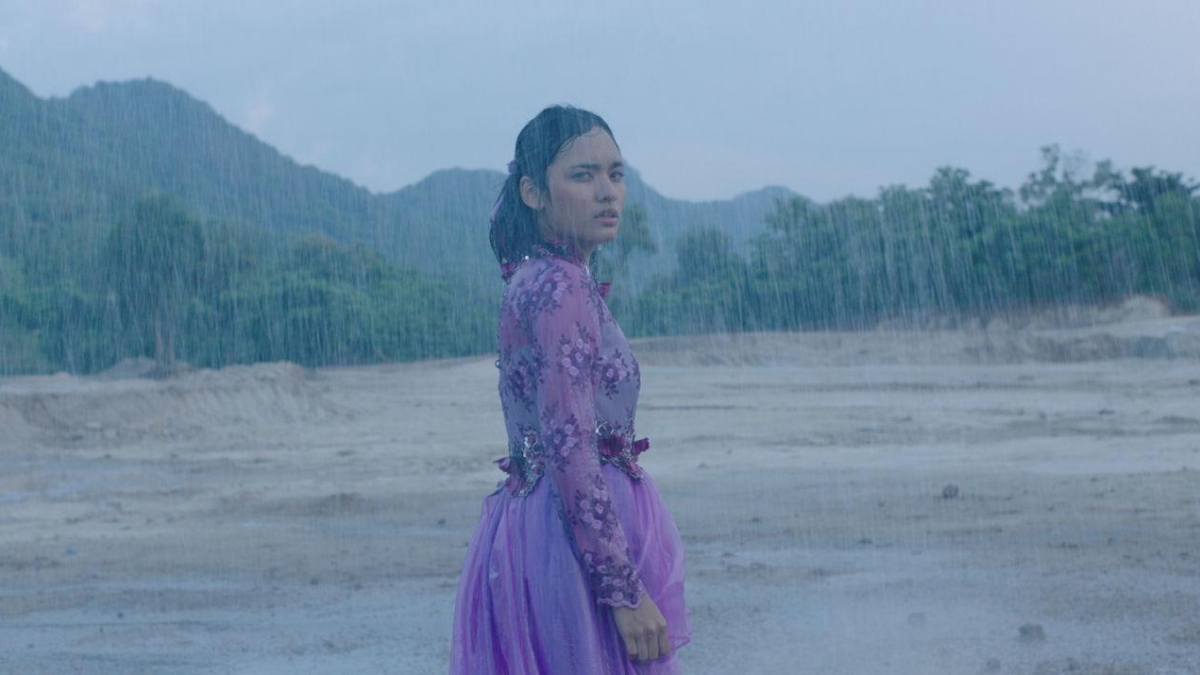A tender glance into the life of a teenager in rural Indonesia
Written by: Patricia Kusumaningtyas
As the title card rolls, we hear the sound of splashing water. The first frame of the film is a girl, slowly emerging from the bathroom, wearing an all-purple ensemble under her Indonesian school uniform. That is our first introduction to the titular teenage character. “Yuni” is the third film by Indonesian director Kamila Andini, and has captivated audiences across the globe, starting from its premiere at the 2021 Toronto International Film Festival to its selection as Indonesia’s submission for the Oscars. The Asian American International Film Festival’s centerpiece screening is “Yuni”’s premiere in New York City.
Yuni (Arawinda Kirana) is a teenage girl living in Serang, Indonesia, trapped between the margins of her West Javanese, Islamic society. She has big ambitions to go to college. However, she has to face marriage proposals from multiple men, as well as the gossip surrounding her every decision. She has a group of friends who hang out together after school. She makes friends with Yoga (Kevin Ardilova), an awkward straight A-student with a love for poetry. And sometimes she would visit Suci Cute’s (Asmara Abigail) salon in the shopping center to get her makeup done and take pictures.

The art form of poetry takes center stage in shaping Yuni’s story. Yoga, who obviously has a crush on her, has been working on Yuni’s literature assignments – the only subject she fails in school. “When I read the story, I want something that is unique and whole; something she could run into, that feels, for her, like she’s going into another world, and I was thinking about poetry,” Andini said in AAIFF’s post-screening talkback. “I know that poetry should be a private room that is very important for everybody in the film.”
Yoga’s poems and his quotes from other poems frame the film, but the most important poem is “Hujan Bulan Juni” (Rain in June) by Sapardi Djoko Damono, an Indonesian poet the film is dedicated to. Water is a common motif in the film; throughout the film, we also see Yuni finding tranquility swimming in her neighborhood pool with her friends, and near the end of the film, we quite literally see rain in the month of June.
But the film’s ties to Sapardi Djoko Damono and “Hujan Bulan Juni” goes deeper than that; Andini mentioned that “my first encounter of poetry is Sapardi’s poetry. … I remember when I was a kid, I learned many things from his poems: about forests, death, about bodies, and about the universe in many ways. His poems are sort of very easy to understand, in terms of diction, in terms of words, but have a very deep meaning as well, so I think it fits Yuni’s first encounter with poetry as well.”
Urban and American audiences fall in love easily with third world-ist stories, portraying women in developing countries facing repressive regimes. Andini’s direction didn’t fall completely into this trap. For urban audiences, Yuni’s story could be misconstrued, politicized, and in its worst case scenario, fetishized; however, for the majority of the world who are closer to Yuni’s lives, her story is, simply, a life lived.
“We have a lot of films in Indonesia about teenagers, but most of them actually talk about teenagers in big cities, talking mainly about Jakarta. Most teenagers actually live in [Yuni’s] kind of place, and live with these kinds of problems,” Andini said. “The problem is very circular, with layers and layers, and this comes from generations, going from one generation into another generation.”

Andini looks into the internal lives of her characters through the framing of her subjects. In one scene, we see Yuni and her friends lying down on lush grass, fingers brushing through stray weeds, talking to each other about sex and masturbation. The shot is framed as if we the audience are there with them, listening to them figure out how to navigate society. Andini’s direction is also apparent through the work of her actors. Arawinda Kirana shines as the cheeky playful Yuni facing an existential decision. One of the most intriguing performances in this film is that of Kevin Ardilova; sheltered and nervous, his gaze never crosses Yuni’s throughout the film.
There is a nuance of watching “Yuni” in an urban festival like AAIFF: In a place like New York, where we are so immersed in culture every step we go, we often forget how inaccessible culture is in most parts of the world. “Yuni” brings this to the forefront. Kamila Andini brings out the internal lives of teenagers in this part of the world onto the urban stage. However, Yuni’s story, in a way, will resonate with any audience. Yuni’s perseverance is built through her friendships. In every salon visit with Suci Cute, in every conversation eating cilok (fried tapioca) with her friends, and in every poem she shares with Yoga, Yuni finds solace amidst her turbulent life.
“Yuni” screened at the 45th Asian American International Film Festival.

